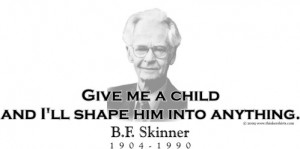 Influential behaviorists like B.F. Skinner were interested in studying natural human reactions and testing them. Skinner believed that people have little control over how we turn out to be as adults, that we are ultimately a product of circumstances and children are extremely malleable. I would say that Skinner most belongs amongst Creationists because of his interest in the way humanity is- and why. Behaviorism generally studies how animals respond and react, and why their “personalities” reflect lessons learned (esp. humans).
Influential behaviorists like B.F. Skinner were interested in studying natural human reactions and testing them. Skinner believed that people have little control over how we turn out to be as adults, that we are ultimately a product of circumstances and children are extremely malleable. I would say that Skinner most belongs amongst Creationists because of his interest in the way humanity is- and why. Behaviorism generally studies how animals respond and react, and why their “personalities” reflect lessons learned (esp. humans).
Skinner is probably most famous for his work with operant conditioning. He was concerned with rewards and punishments that happened after the response of the experiment, which he called “reinforcements”. These dictated what responses would occur later after future trials because the subject was either more or less likely to repeat the same behavior after the reinforcement. Skinner was curious as to why we respond the way we do in different situations. He attempted to explain the production of behaviors. Many behaviorists argue that our personality is basically just a compilation of our learned behaviors and habits- in what situations an individual has been punished or rewarded. This view gives little credit to people as having free thoughts. Although Skinners contributions to psychology were considerably modern, therapists today still hold his techniques and research invaluable.

Zach Stromberg
3:10 pm, 12.02.13
Interesting ideas Lindsay!! I agree with you, Skinner could definitely fit under the category of creation because of his hunger for understanding why we are the way we are. In that includes, marveling at and unraveling the beauty of creation. I’m sure he fits under the category of the fall too because behaviorism definitely can be focused on reactions, behaviors, and rewards that are destructive or immoral.
Haley Conaway
7:30 pm, 12.02.13
I like viewing Skinner as a creation philosopher. He definitely focused on how behavior is created and the beginning/creation stages of humans in their malleable / formative state.